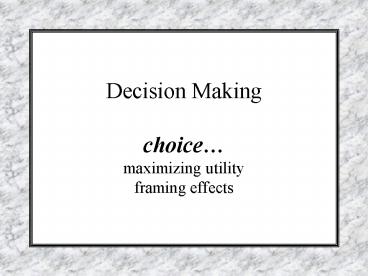Decision Making choice PowerPoint PPT Presentation
1 / 18
Title: Decision Making choice
1
Decision Makingchoicemaximizing
utilityframing effects
2
Value
- Round 1 Raise your hand if your birthday occurs
in the first half of the year (jan-june 30th) - Congratulations, you just won!
- You are entitled to one of our prizes
- Prize A 15
- Prize B 10
- Which one do you choose?
- Duh!
- Prize A value gt Price B value
3
Expected value
- Round 2 choose prize first
- Winners will be decided based on the last digit
of their SSN - Prize C 15
- if your SSN digit matches the number that comes
out - for example, if 7 comes out and your SSN ends
in 7 - Prize D 10
- if your SSN digit is in the selected category
(larger/smaller than 5) - For example, if 7 comes out, and your SSN ends
in 5, 6, 7, 8 or 9 - Which one do you choose to play?
4
Expected value
- Obviously, you chose prize D. Why?
- Expected value
- Prize C 15 x .1 1.5
- Price D 10 x .5 5.0
- EV Value x Probability
5
Expected Utility
- How desirable a bet is depends on
- Expected value (size of Payout x Probability )
- How much an individual values that payout (Saving
a tree, , etc.) - This provides a single scale for the goodness of
any particular choice - Utility how happy or satisfied something makes
you (how desirable something is)
6
Utility theory A Normative Theory of Choice
- Describes how people should make decisions
- In making a decision, you should
- Assess how worthy each outcome is to you
(subjective utility) - Assess how likely each outcome is
- Compute the expected utility of each possible
option - Compare those expected utilities
- Select the choice with largest expected utility
7
Example should you buy a lottery ticket?
--Largest powerball jackpot ever
195,000,000 !! --Probability of winning the
powerball 1 in 10,000,000,000. --The expected
value .00000000001 x 195,000,000 2 lousy
cents. Should you buy a ticket? Only if it costs
2c or less.
8
Utility theory Criticism
- There are several problems with Utility theory
- Probability outcomes are often unknown
- What is the probability that he will say yes if
I ask him out? - Its tricky to assess the expected utility of
future outcomes - How happy would I be to have chosen Nova?
- Lots of evidence that people do not reason this
way
9
Please make your selection...
- Option A. Winning 40 with probability .80
- Option B. Getting 30 for sure
Certainty Effect People tend to prefer sure
gains (risk averse for gains) Eva 40 x .8
32 EVb 30 x 1 30
10
- Framing effects Positive Frame
- Students in right side of class will answer
- Imagine that the US is preparing for the outbreak
of an unusual tropical disease, which is expected
to kill 600 people. Two alternative programs to
combat the disease have been proposed. The
estimates of the programs effects are as
follows - Program A
- 200 people will be saved.
- Program B
- 1/3 chance that 600 people will be saved.
- 2/3 chance that 0 people will be saved.
11
- Negative Frame
- Students in right side of class will answer
- Imagine that the US is preparing for the outbreak
of an unusual tropical disease, which is expected
to kill 600 people. Two alternative programs to
combat the disease have been proposed. The
estimates of the programs effects are as
follows - Program C
- 400 people will die.
- Program D
- 1/3 chance that 0 people will die
- 2/3 chance that 600 people will die.
12
Negative Frame
Positive Frame
- Program A
- 200 people will be saved.
- Program B
- 1/3 chance that 600 people will be saved.
- 2/3 chance that 0 people will be saved.
- Program C
- 400 people will die.
- Program D
- 1/3 chance that 0 people will die
- 2/3 chance that 600 people will die.
72 of subjects pick Program A when the problem
is framed in terms of lives saved. With the
positive frame, subjects are risk averse.
Only 20 of subjects pick Program C when the
problem is framed in terms of deaths. With the
negative frame, subjects become risk takers.
13
Donating money saving lives
- Each life is worth the same
14
- How much money would you give to save
- Rokia
- To save people from the village where Rokia lives
15
A Hypothetical Value Function
Value
gains
losses
- The pain of a loss is greater than the
pleasure of a gain. - small loses hurt
(proportionally more) than big losses
16
Cash or Credit??
1.30/gal 5 cent discount for cash...
gains
Discount seems negligible, people use credit
card.
1.25/gal 5 cent charge for credit...
Surcharge is outrageous people pay cash.
17
Framing effects are everywhere Whats better?
A basketball player who makes 75 of his
free-throws, or one who misses 25 or his
free-throws?
18
Summary
- Utility theory fails to describe how people make
decisions - Frame effects
- Influence of justifications (minimize regret)

